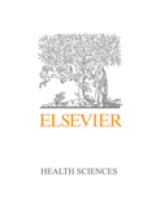Essential reading for candidates for the MRCPath examination and similar postgraduate examinations in clinical biochemistry. The book gives an overview of the acquisition of data, as well as concentrating on clinical aspects of the subject, giving detailed coverage of all conditions where clinical biochemistry is used in diagnosis and management. In common with other diagnostic specialties clinical biochemistry now uses an increasing number of techniques involving the 'new biology': these are covered in this book. It is also increasingly common for medically qualified clinical biochemists to become involved in the clinical management of patients (eg nutritional support) and material on this will be included.
New to this edition
- Expanded sections on haematology and immunology for clinical biochemists provide a thorough understanding of both laboratory and clinical aspects
- New chapters are included on important evolving areas such as the metabolic response to stress, forensic aspects of clinical biochemistry and data quality management
- An extended editorial team - including three expert new additions – ensures accuracy of information and relevance to current curricula and clinical practice
- A superb new accompanying electronic version provides an enhanced learning experience and rapid reference anytime, anywhere!
Elsevier ExpertConsult.com
Enhanced eBooks for medical professionals
Compatible with PC, Mac®, most mobile devices and eReaders, browse, search, and interact with this title – online and offline. Redeem your PIN at expertconsult.com today!
- Straightforward navigation and search across all Elsevier titles
- Seamless, real-time integration between devices
- Adjustable text size and brightness
- Notes and highlights sharing with other users through social media
- Interactive content
Key Features
From the author of the popular Clinical Chemistry medical student textbook.
Although there are many competing texts on clinical chemistry, the vast majority concentrate on the technology; this book concentrates on the clinical.
Ideally suited for preparation for the MRCPath and similar examination.
Author Information
By William J. Marshall, MA, PhD, MSc, MBBS, FRCP, FRCPath, FRCPEdin, FRSB, FRSC, Emeritus Reader in Clinical Biochemistry, Kings College London, London, UK; formerly Consultant Clinical Biochemist and Clinical Director of Pathology, The London Clinic, London, UK.; Márta Lapsley, MB BCh BAO, MD, FRCPath, Consultant Chemical Pathologist, Epsom and St. Helier University Hospitals NHS Trust, Epsom, Surrey, UK; Andrew Day, MA MSc MBBS FRCPath, Consultant in Clinical Biochemistry and Metabolic Medicine, University Hospitals Bristol NHS Foundation Trust, Bristol, UK and Ruth Ayling, PhD FRCP FRCPath, Consultant in Clinical Biochemistry, Derriford Hospital, Plymouth, UK
The uses of biochemical data in clinical medicine. The acquisition of biochemical data. The interpretation of biochemical data. Sodium, water and potassium. Hydrogen ion homoeostasis, tissue oxygenation and their disorders. Calcium, phosphate and magnesium. The kidneys, renal function and renal failure. Proteinuria. Renal tubular disorders and renal stone disease. The clinical biochemistry of nutrition. Nutritional disorders and their management. The clinical biochemistry of the gastrointestinal tract. The assessment of hepatic function and investigation of jaundice. Acute and chronic liver disease. Diabetes mellitus: pathophysiology and biochemical background. The clinical management of diabetes mellitus. Hypoglycaemia. Hypothalamic, pituitary and adrenal disorders. Thyroid dysfunction. Hormonal aspects of non-endocrine disease. Abnormal sexual development. The clinical biochemistry of female reproductive function, including pregnancy, oral contraception and hormone replacement therapy. Reproductive function in the male. Inherited metabolic disease. Paediatric clinical biochemistry. Biochemical aspects of anaemia. The porthyrias and disorders of haem synthesis. The haemoglobulinopathies. Immunology for clinical biochemists. Metabolic bone disease. Biochemical aspects of articular disease. Muscle disease. Investigation of cerebrospinal fluid. Biochemical aspects of psychiatric disorders. Biochemical aspects of neurological disease. Biochemical aspects of mental retardation. Lipid metabolism, hyper- and hypo-lipidaemias. The clinical biochemistry of the cardiovascular system. Therapeutic drug monitoring. Poisoning. Metabolic effects of tumours. Tumour markers. Molecular clinical biochemistry. Free radicals.
"An invaluable resource... Information is wide ranging and detailed but also very practical, being applicable to the real questions about real patients that we have to deal with every day. There are lots of tables for easy reference. I heartily recommend this book."
Elizabeth Hall, Annals of Clinical Biochemistry


